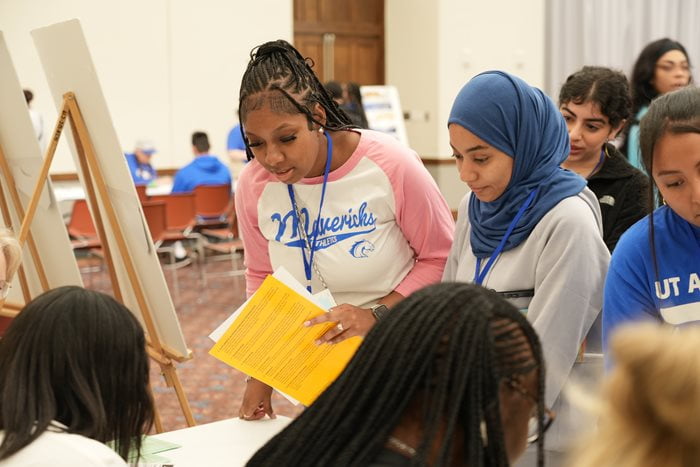UTA School of Social Work Expands Interprofessional Education to Prepare the Workforce to Identify and Report Child Maltreatment
The University of Texas at Arlington School of Social Work, in partnership with the Texas Alliance of Child and Family Services, is launching three new interprofessional education (IPE) modules this fall to better prepare students and professionals across disciplines to identify, report and respond to child maltreatment.
IPE brings students from different fields together to learn how their roles intersect. The approach fosters collaboration, builds understanding across disciplines and prepares future professionals to respond more effectively to complex real-world situations.
“These three new IPEs are part of a larger project, the Interprofessional Education to Promote Equity In Mandated Reporting, a certificate approach,” said Dr. Catherine LaBrenz, UTA School of Social Work associate professor and director of the Child Welfare Research Center. In partnership with Professor Tracy Orwig (UTA), Dr. Jandel Crutchfield (UTA), Dr. Micki Washburn (UTA), Andrea Requenes (Texas Alliance of Child and Family Services), and Chelsy Alexander (Texas Alliance of Child and Family Services), and a Community Advisory Board, Dr. LaBrenz is leading the project to improve workforce preparation among students in disciplines that serve children and families.

UTA School of Social Work Students participate in an interprofessional education (IPE) module on April 7, 2025.
The modules, developed with input from social services, education, health care and criminal justice professionals, present simulated child welfare cases designed to spark cross-disciplinary discussion and build professional lived experience.
These new IPEs include:
Maya’s case
The first module introduces Maya, an adolescent on probation for a one-time shoplifting offense. When a probation officer visits her home, they notice the smell of marijuana but find no evidence of its use. Her mother explains she had a legal prescription while living in California but did not realize the rules were different in Texas.
“In this case, we’re connecting social work and criminal justice students,” LaBrenz said. “We want to ask, how do you go about making sure that that a child is safe, but also what are the important factors to consider in this scenario?”
Rather than focusing on a “right” answer, the scenario encourages students to weigh legal definitions against real-life context. “We’re hoping students engage in discussions about why or why not to report parental substance use and really start critically thinking about how they would approach cases like this,” LaBrenz said.
Alicia’s case
The second module centers on Alicia, a teen placed with her aunt after experiencing sexual abuse. Alicia, who has autism, refuses to attend school after being humiliated during an assembly.
“It really is trying to shift the narrative from reporting in terms of, ‘hey, something’s going on, let’s pick up the phone and call the hotline,’ to thinking ‘well, maybe there’s something that has to be reported and we’d certainly do that, but let's look for other solutions first’,” LaBrenz said. “Maybe we can shift from this ‘see something, say something’ mindset to focus on how we can really support the children and families we’re working with.”
Alex’s case
The third case, led by Professor Tracy Orwig, UTA School of Social Work Director of Interprofessional Education and associate professor of practice, deals with a disclosure of sexual abuse.
“Alex’s case is one where we introduce students to the reporting process,” Orwig said. “So how do you make a report and when to make a report online versus via telephone.”
In the scenario, Alex discloses abuse by an uncle. Students walk through communication between nursing, social work and law enforcement, while practicing trauma-informed care.
“We want to stress the importance of safety issues that need to be reported,” Orwig said. “IPE is an opportunity for us to learn from each other. These are safe spaces for students to do this, and it’s an opportunity for us to give them feedback. It’s a safe space for them to practice this stuff and not be worried about getting it wrong.”
Beyond the classroom
These three new IPEs focus on different aspects of potential child maltreatment and allow students to explore the acts of investigation, problem-solving and direct reporting in cases within the learning environment.
Along with these new IPEs, the School of Social Work plans to expand the modules in spring 2026 by involving community providers.
“Our idea is that professionals working in criminal justice, healthcare, education and social services can sign up to participate too,” LaBrenz said.
“Ultimately, the goal is to help future and current professionals navigate complex cases with confidence,” LaBrenz added. “We want those professional competencies to kick in. Yes, these cases are heavy, however, we want to give students and professionals a place to practice those competencies and know what to do so that they have the needed knowledge and skills whenever they’re placed into real situations.”